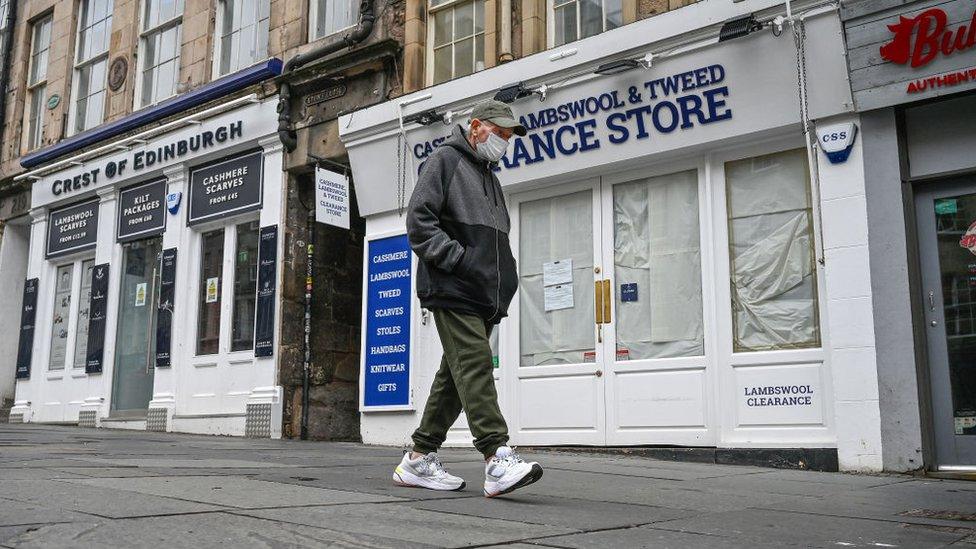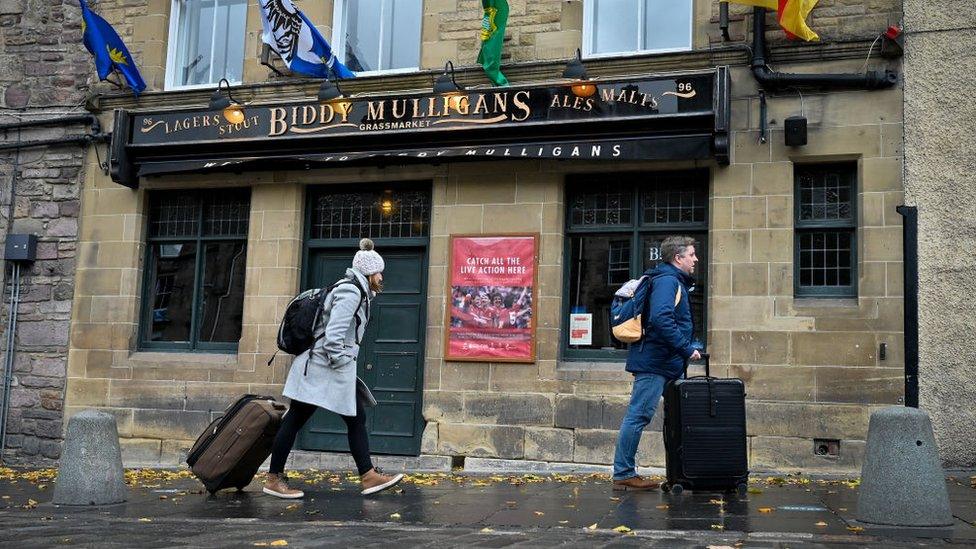Covid in Scotland: Pandemic leaves businesses 'close to exhaustion'
- Published

Scottish businesses are "close to exhaustion" after 12 months of the "some of the most challenging trading conditions in modern history".
Scottish Chambers of Commerce said Covid restrictions and new rules for trading with the European Union had taken their toll.
Its quarterly survey of 370 firms confirmed that retail had been worst affected.
Tourism businesses are more positive as lockdown controls begin to be lifted.
Non-essential shops are likely to be allowed to reopen on 26 April following a four month closure, while pubs, restaurants and cafes will also be able to reopen on a limited basis.
The Scottish government has linked the emergence from lockdown to the rollout of the vaccine. On Tuesday Nicola Sturgeon confirmed that Scotland had "effectively met" its initial vaccination target.
Scottish Chambers of Commerce said there was optimism about the vaccine in the business community.
However its quarterly economic indicator for January to March 2021 also found that:
Retail was the worst-performing sector, having spent most of the period in lockdown - optimism and sales collapsed
Tourism is more hopeful ahead of the return of domestic visitors, but they report cash flow declines and recruitment remains low
Trading difficulties with Europe are a significant issue for businesses in financial and business services, and manufacturing - though there are signs of emerging confidence
Confidence in the construction industry is subdued as costs have spiralled, though they are positive about contracts in the pipeline.
Tim Allan, the group's president, said: "Businesses in Scotland are close to exhaustion as they continue the slog through some of the most challenging trading conditions in modern history.
"As the easing of restrictions come, albeit slowly, serious questions over how long trading will continue to be limited remain while businesses trading with the EU have faced fresh difficulties at the border. Rising costs is also a significant issue."

He told BBC Radio's Good Morning Scotland that Nicola Sturgeon's decision to ease travel and socialising limits from Friday was "a little bit underwhelming".
"Allowing people greater movement in the country is welcome from a morale point of view, people want to go and visit family and friends in other parts of the country, but from a business perspective it did very little," he said.
He called for a "reset" of relations with the Scottish government and a Business Growth Act within the first 100 days of the new parliament.
"Every single sector with the exception of manufacturing in the last quarter reported falls in confidence, cash flow, employment," he said.
"There are major headwinds for Scottish business so we've called for a fundamental reset in the relationship with politics, politicians, policy makers.
"We need to have a business action bill - we want an act passed in the first 100 days of the new parliament which addresses the issues of skills, business support, international trade, reducing business costs and the interference of government in private enterprise."
Meanwhile, the Scottish Beer and Pub Association has called for a dedicated recovery plan and fund for pubs, and a Scottish pubs minister to lead the recovery.
The group's president, Edith Monfries, said: "There are over ,4000 pubs in Scotland and 130 breweries contributing £1.66bn to the economy and paying £785m in wages. Fast tracking the recovery of our sector will be critical to Scotland's economic and social recovery.
"We need a long-term plan that makes Scottish pubs and breweries sustainable for the future so that Scotland's vibrant hospitality and tourism sector can thrive once again."

